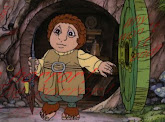"The Unexpected Party"
All of the dwarfs in the movie are much more good-looking and heroic and rugged than in the book, where they are presented in serio-comedic ways. They are presented serio-comically in the Rankin animation, of which I am also a fan. They are also presented comically (they sound like Muppets)--at least initially--in the radio dramatization, with the exception of Thorin.
I agree with the decision here to make the dwarfs heroes in their own right rather than clownish figures. Richard Armitage as Thorin glowers as much as book Thorin and has the same sense of his own dignity but more because he is a prince rather than a bombastic politician (princes are easier to like than politicians). As mentioned above, the radio dramatization also makes Thorin a kingly figure in his own right, being voiced by John Justin, a baritone with a commanding voice.
To continue with the movie dwarfs, Kili is hot and Bofur is adorable. And Ken Stott as Balin is thoroughly impressive in his ability to look affable and then stern, rather like Mark Williams as Father Brown.
Again, I approve, in part because I like the idea of the dwarfs varying in terms of appearance and background. Just as humans vary considerably in appearance, so do all the other sentient species of Middle Earth. Tolkien wasn't one for pure essentialism (the elves, for instance, are quite distinct in their beliefs, appearance, art/architecture, attitudes, language, and politics).
The dwarfs are also given distinct personalities which, in the book, they gain only incidentally, with Bombur being the most distinct followed by Balin (after Thorin, of course). The movie audience needs to engage with this group of 12+ characters immediately, and it is much easier to engage if they are not "ha-ha" characters--well, not all of them and not all the time. (Even the "ha-ha" characters are given distinct features: an axe in the head, excitable youthfulness, an ear trumpet.)
Martin Freeman as Bilbo is, of course, immediately engaging. I had a student who complained about him not being a stout, jolly figure (like Rankin's Bilbo), but other than de-aging Ian Holm, Martin Freeman as Everyman is about as spot-on a casting choice as one can get. (The radio drama engagingly presents Bilbo as a kind of Winnie-the-Pooh character who keeps interrupting the narrator.)
The opening scenes of the movie are close to the first chapter, even to the joke about Golf (which, yes, comes from the book). The humor is there as well as the haunting "siren-like" call to adventure. One of my favorite movie scenes is Bilbo leaning against his bedpost while he listens to the dwarfs' song.
He does make the decision to go "on an adventure" himself--rather than being harried into the adventure by Gandalf. Without a voice over--which absence I also agree with--the viewer needs to see Bilbo make the decision, and with a slight turn of his head and curling of his hand, Freeman pulls this off.
The radio drama, of course, relies far more on the voice-over, both by Bilbo and the narrator. However, even there, the voice-over and narrator are not too heavily applied. In fact, the radio drama brings home how "scene-ready" Tolkien's text is. It may not seem that way since it is fairly heavy on exposition. But story with problem starts the book. Story with problem continues it.
In fact, Jackson COULD have started with Freeman and Gandalf--but I appreciate the appearance of Ian Holm as Bilbo.
 |
| 1931-2020 |






No comments:
Post a Comment